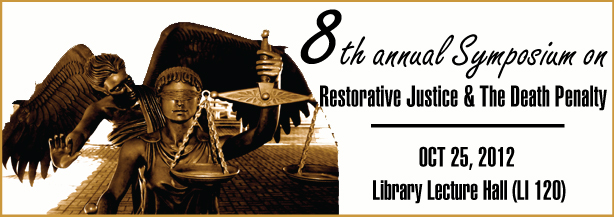News & Announcements
- Details
- Written by Joshua Wachtel
Here's from a piece by Ben Byrne in UK's The Guardian. In these first few paragraphs he makes a concise case for Restorative Justice for youth offenders:
Every local authority is grappling with the challenge of increasing demand for services at a time of severe financial constraint. To meet this challenge we will need new partnerships and new relationships with our residents to help us solve local problems.
One way to approach this challenge is to put restorative practice at the heart of a local authority's work. Surrey's restorative story started in youth justice and our impressive results mean we have tried to spread the principle across the work of the county council.
- Details
- Written by Joshua Wachtel
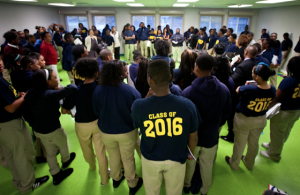 Morning circle session for 9th graders at Plymouth Education Center in DetroitOn Tuesday, Melinda Clynes wrote an article in Model D, "a web-based magazine creating new narratives for Detroit since 2005," titled "City kids: How proactive restorative practices benefit all." Framing the argument for restorative practices in terms of the failures of No Child Left Behind, Clynes writes:
Morning circle session for 9th graders at Plymouth Education Center in DetroitOn Tuesday, Melinda Clynes wrote an article in Model D, "a web-based magazine creating new narratives for Detroit since 2005," titled "City kids: How proactive restorative practices benefit all." Framing the argument for restorative practices in terms of the failures of No Child Left Behind, Clynes writes:
While national education leaders try to repair the wrongs of public education, plotting their post No Child Left Behind moves, here in Detroit, some folks tout that school reform might better begin with developing and nurturing relationships among students, between students and teachers, and between schools and community.
- Details
- Written by Joshua Wachtel
Educational Leadership has a piece this month by Larry Ferlazzo "Eight Things Skilled Teachers Think, Say, and Do" that rings true on a number of levels.
The list includes:
- Remember that authoritative beats authoritarian.
- Believe that everyone can grow.
- Give positive messages.
- Apologize (i.e., being willing to admit that as a teacher, you are also human).
- Be flexible.
- Set the right climate.
- Details
- Written by Joshua Wachtel
Brooke Adams of the Salt Lake City Tribune writes:
There are approximately 57 countries that use capital punishment for the most heinous crimes, but only one is a western industrialized nation: The United States.
Capital punishment in the U.S. in the context of state, national and international policies will be the focus of the eighth annual symposium on the death penalty sponsored by Utah Valley University on Thursday. The event will feature such experts as James Acker, a criminal justice professor at State University of New York, Albany, and co-director of the Capital Punishment Research Initiative; Ted Wachtel, founder of the International Institute for Restorative Practices; and Alan Clarke, a UVU professor.
- Details
- Written by Joshua Wachtel
 The Restorative Justice Council in the UK writes: "The UK has opted in to a European Union (EU) Directive establishing the right of victims to safeguards in restorative justice services and recognising the ‘great benefit’ to victims that participation in restorative justice brings. The Restorative Justice Council worked with the European Forum for Restorative Justice to secure changes to the draft Directive, based on the evidence that RJ, delivered well, provides many benefits for victims. The final text of the Directive reflects the benefits of participation in restorative justice and sets out the need for minimum standards to ‘ensure victims have access to safe and competent restorative justice services’."
The Restorative Justice Council in the UK writes: "The UK has opted in to a European Union (EU) Directive establishing the right of victims to safeguards in restorative justice services and recognising the ‘great benefit’ to victims that participation in restorative justice brings. The Restorative Justice Council worked with the European Forum for Restorative Justice to secure changes to the draft Directive, based on the evidence that RJ, delivered well, provides many benefits for victims. The final text of the Directive reflects the benefits of participation in restorative justice and sets out the need for minimum standards to ‘ensure victims have access to safe and competent restorative justice services’."
- Details
- Written by Joshua Wachtel
This week's Sunday video comes from The National, a program on CBC (Canadian Broadcasting Corporation). This 3 and a 1/2 minute clip shows how talking circles in a Toronto school are being used to confront the issue of bullying head on.
- Details
- Written by Joshua Wachtel
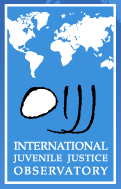 Here is the International Juvenile Justice Observatory (IJJO) announcement of its conference November 6 & 7 in London, England titled "Criminality or Social Exclusion: Justice for Children in a Divided World":
Here is the International Juvenile Justice Observatory (IJJO) announcement of its conference November 6 & 7 in London, England titled "Criminality or Social Exclusion: Justice for Children in a Divided World":
Even before the ‘credit crunch’ of 2008 and the economic crises of 2011, the globalization of neo-liberal economic and fiscal regimes was generating growing social, economic and cultural polarization.
This has resulted in ever increasing numbers of children, young people and families finding themselves located in areas of concentrated social disadvantage on the margins of society where ethnic minority and migrant people are heavily represented.
- Details
- Written by Joshua Wachtel
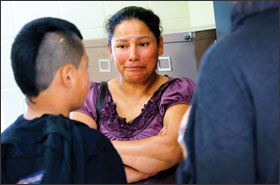 photo by Sarah Rice for EdWeek
photo by Sarah Rice for EdWeek
EdWeek has published the first in a four-part series of articles by Nirvi Shah called "Rethinking Discipline."
The introduction to the series notes: "Zero-tolerance policies, which require out-of-school suspension or expulsion for certain inappropriate behaviors, have become the go-to disciplinary approach in many schools. But research suggests some downsides: Such punishments may not change students’ behavior and are often meted out unfairly. This article is the first in a four-part series exploring alternative approaches."
In this first piece the focus is on restorative practices. City Springs Elementary School, which has worked closely with IIRP, features prominently in the article, and IIRP trainer Mary Jo Hebling is quoted:
- Details
- Written by Joshua Wachtel
 Town Center, photo by Theodore Scott at Flickr Creative CommonsIIRP UK & Ireland present a one-day conference: "Putting Theory into Practice:
Town Center, photo by Theodore Scott at Flickr Creative CommonsIIRP UK & Ireland present a one-day conference: "Putting Theory into Practice:
The Restorative Way" in Swansea, Wales on November 29, 2012. Belinda Hopkins, of Transforming Conflict, writes on her blog:
"Our colleagues at the UK branch of the International Institute of Restorative Practices are branching out and organizing their first ever UK home-grown conference. They are having it in Swansea which has been making great headway spreading restorative practice across the city.
"CEO Les Davey, a friend and hugely respected colleague for many years, has kindly invited us to be there and share what we offer. Come along and join us there - support what Swansea is doing and continue to spread the word.
- Details
- Written by Joshua Wachtel
IIRP President Ted Wachtel will be visiting the Netherlands in early November. He will be leading "An Inspirational Presentation and Dialog" on the subject of "Building a Worldwide Restorative Practices Learning Network" in cooperation with Eigen Kracht Centrale and Restorative Justice Nederland.
Rob van Pagée and Hedda van Lieshout will present the vision of the independent organization Eigen Kracht Centrale, which asserts that citizens are uniquely able to deal with their own situation, by getting together with others directly affected, to discuss what is happening and to make a restorative plan for a solution.
Gert Jan Slump and Anneke van Hoek from Stichting Restorative Justice Nederland will reflect on “when worlds meet” — the potential for mutual learning created by Restorative Justice — when a crime brings together criminal justice professionals with offenders, victims and community members in a setting other than the courts.
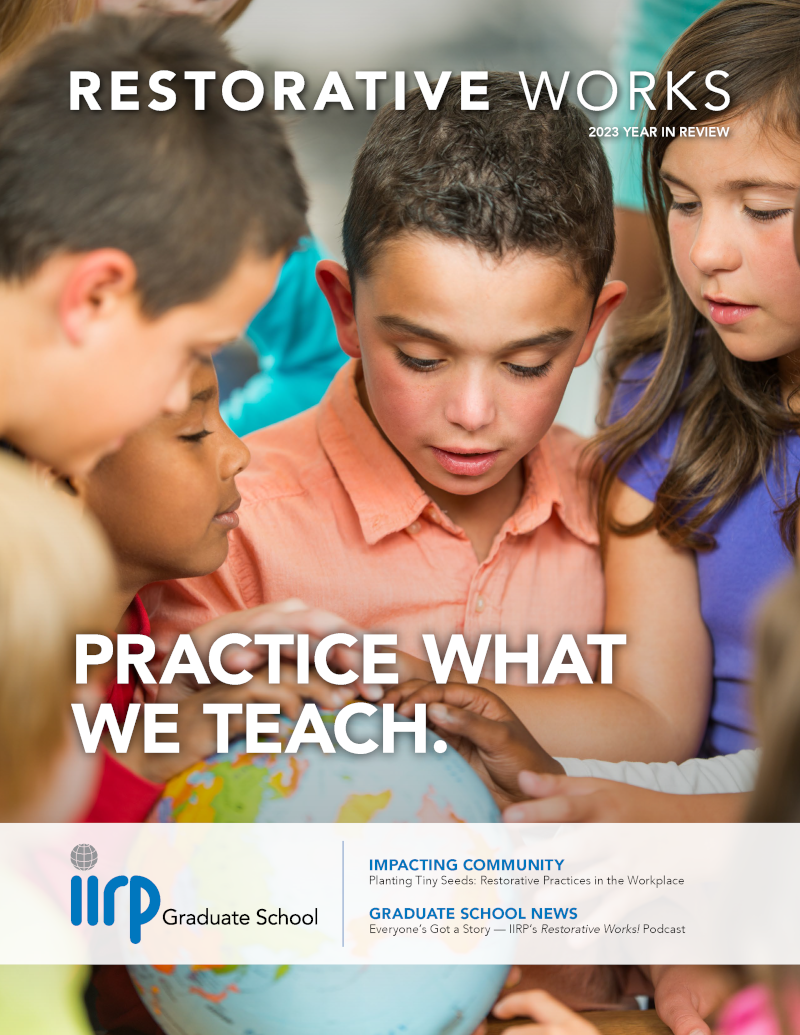
Restorative Works Year in Review 2023 (PDF)
All our donors are acknowledged annually in Restorative Works.

